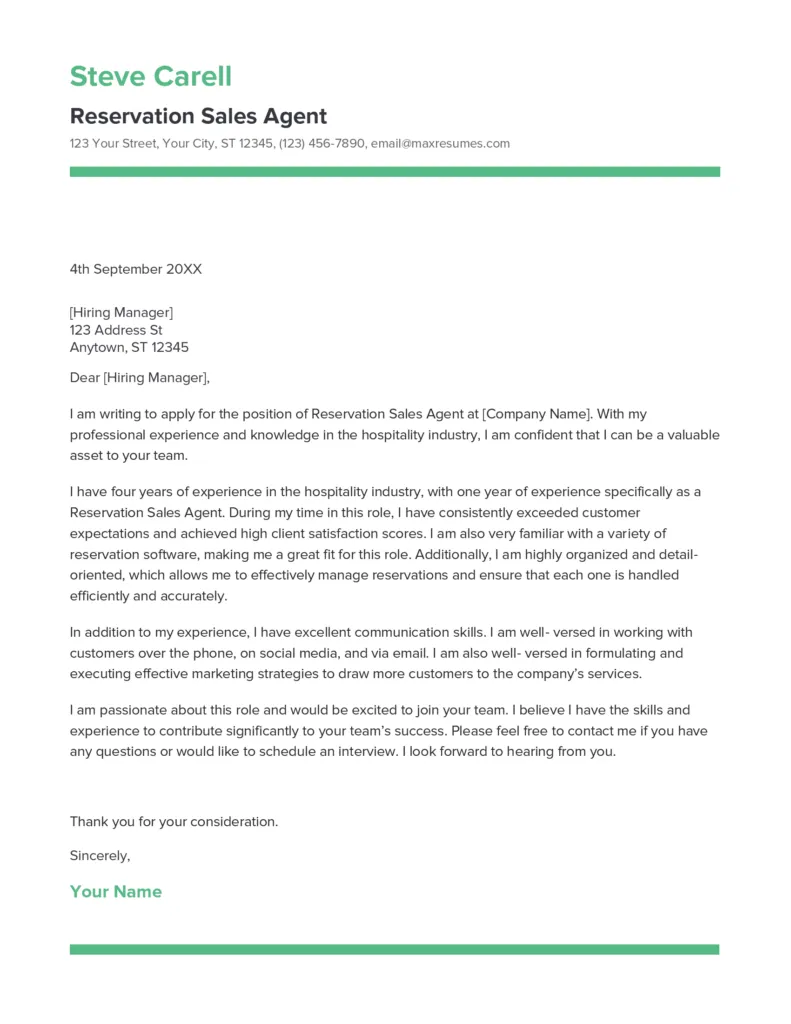Crafting a Winning Cover Letter for Ticket Sales
In the competitive world of ticket sales, a well-crafted cover letter is your first step towards landing the job. It’s your chance to make a strong first impression, showcasing your skills, experience, and enthusiasm for the role. This guide will walk you through the essential elements of a compelling cover letter, helping you stand out from the crowd and increase your chances of success. Remember, a cover letter isn’t just a formality; it’s a powerful tool to demonstrate your suitability and passion for the ticket sales industry.
Understanding the Ticket Sales Industry
Before diving into your cover letter, it’s crucial to understand the ticket sales landscape. This industry requires individuals who are not only sales-driven but also possess strong communication, customer service, and negotiation skills. Successful ticket sales professionals thrive on building relationships, understanding customer needs, and closing deals. Familiarize yourself with the types of events, venues, and ticketing platforms relevant to the job you’re applying for. Demonstrating this knowledge in your cover letter shows your genuine interest and preparedness. Furthermore, consider how the rise of digital ticketing and the importance of data analytics have changed the sector and how you can adapt to this in the job.
Key Skills for Ticket Sales Professionals
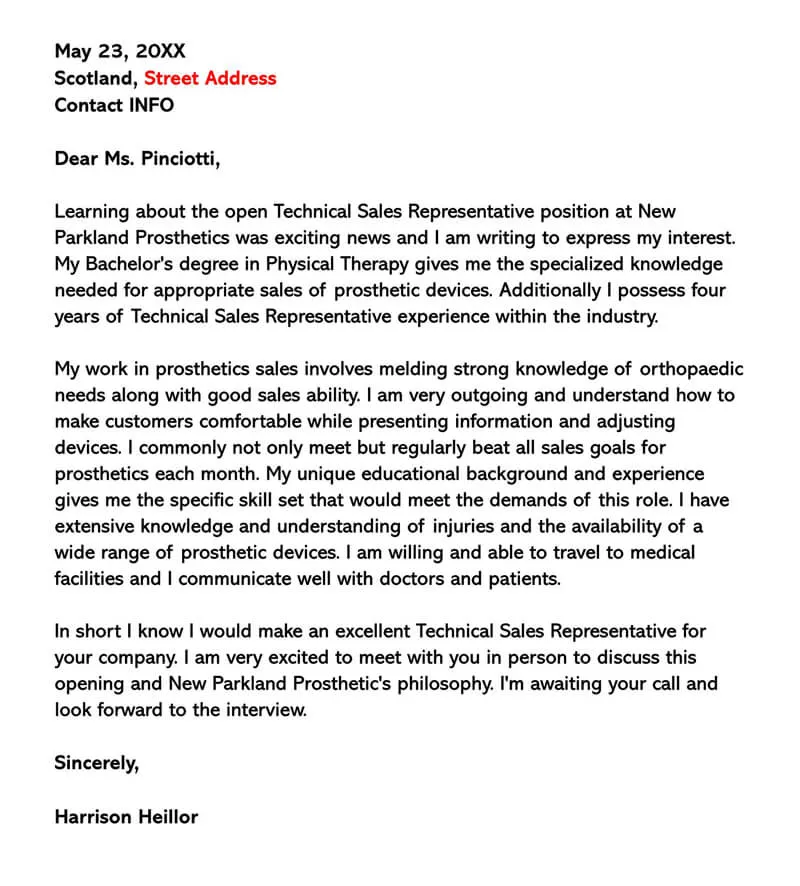
Your cover letter should highlight the skills most valued in ticket sales. These typically include strong sales acumen, excellent communication (both written and verbal), and the ability to build rapport. Problem-solving skills are also crucial, as ticket sales often involve resolving customer issues and handling complex transactions. Additionally, proficiency with CRM software, data analysis, and a deep understanding of the event or venue you are selling for can set you apart. Make sure to use keywords from the job description to illustrate your ability to meet the role’s specific requirements. Demonstrate your customer service experience by showing examples of your professional background.
Essential Components of Your Cover Letter
Header and Contact Information
Begin your cover letter with a professional header that includes your full name, address, phone number, and email address. Ensure your email address is professional and easy to read. The date should also be included, along with the hiring manager’s name and title (if you know it), and the company’s address. This sets a formal and professional tone right from the start.
The Salutation
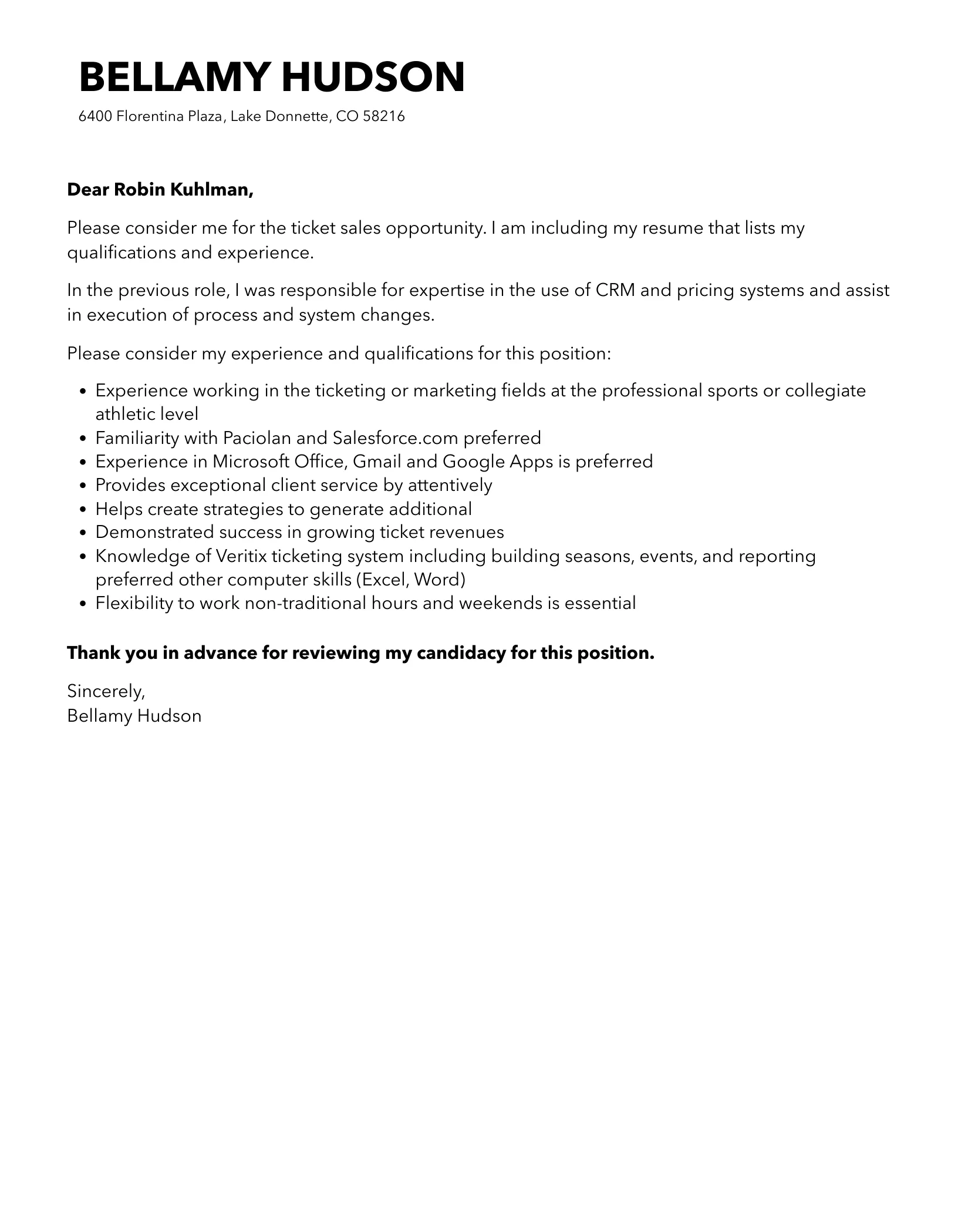
Address the hiring manager by name if possible. Research the company to find the correct name and title. If you cannot find the hiring manager’s name, use a general salutation such as ‘Dear Hiring Manager’ or ‘Dear [Company Name] Team’. Avoid generic greetings like ‘To Whom It May Concern,’ as they show a lack of personalization.
Opening Paragraph Hooking the Reader
Your opening paragraph is your first opportunity to capture the reader’s attention. Start with a compelling statement about why you’re interested in the role and the company. Briefly mention your most relevant qualifications and enthusiasm for the ticket sales industry. Consider mentioning a specific achievement or skill that aligns with the job description to immediately show your suitability. Be concise and engaging to make sure that the reader is instantly interested in you.
Highlighting Relevant Experience
In the body of your cover letter, provide a brief overview of your relevant experience. Focus on roles that involve sales, customer service, or communication. Use the STAR method (Situation, Task, Action, Result) to describe your accomplishments and demonstrate your impact in previous roles. Include specific examples of how you exceeded sales targets, improved customer satisfaction, or resolved complex issues. Always align your experience with the specific requirements outlined in the job description.
Showcasing Transferable Skills
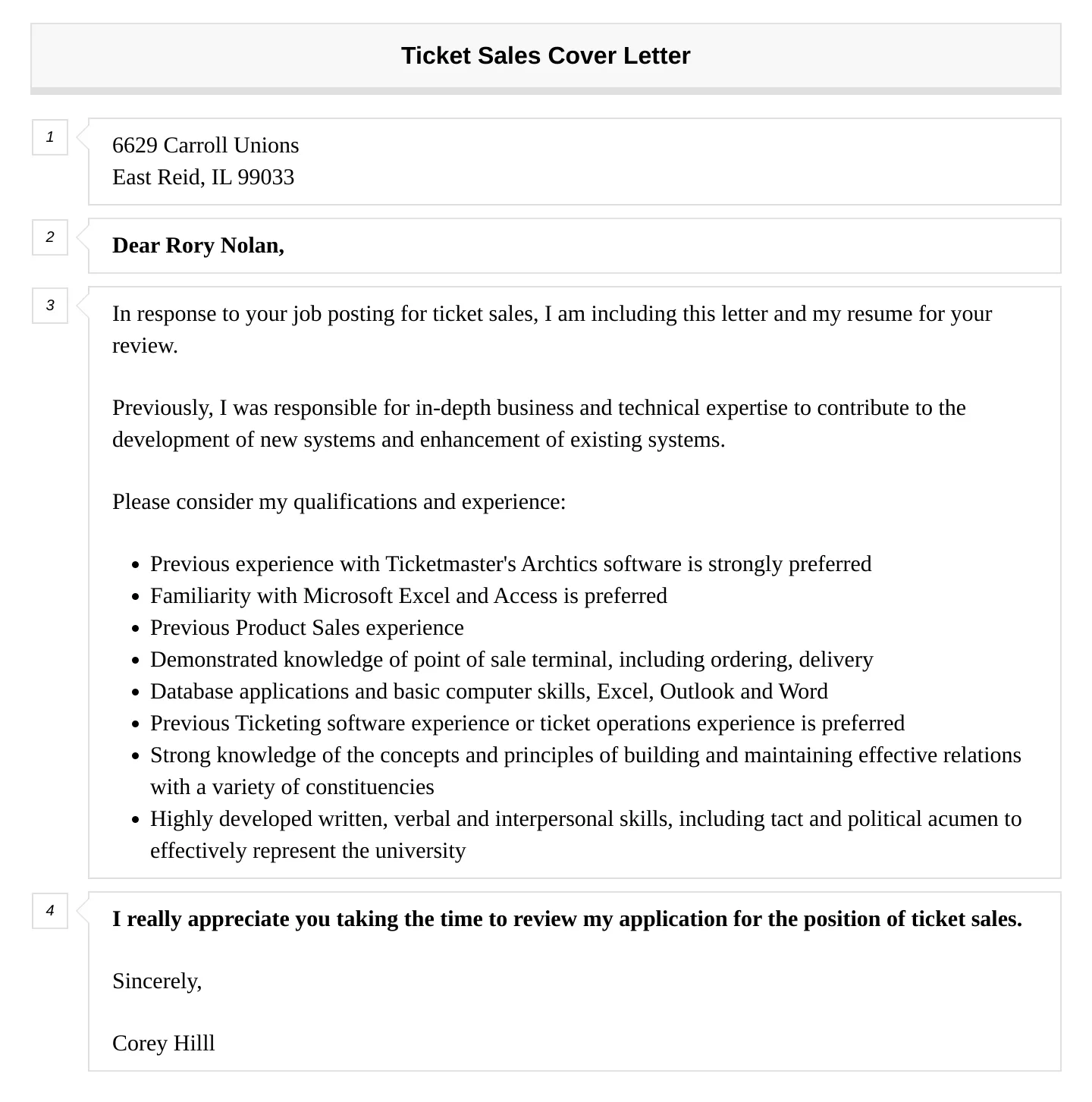
Even if you lack direct ticket sales experience, you can highlight transferable skills that are valuable in the industry. Skills such as communication, negotiation, problem-solving, and relationship-building are highly sought after. Provide examples of how you’ve successfully applied these skills in previous roles or situations. If you’ve worked in customer service, retail, or any environment that requires interacting with the public and meeting sales goals, you can demonstrate your suitability for ticket sales.
Quantifying Achievements and Results
Whenever possible, quantify your achievements to demonstrate your impact. Use numbers, percentages, or specific data to illustrate your successes. For example, instead of saying ‘Increased sales,’ say ‘Increased sales by 20% in six months.’ This makes your accomplishments more tangible and impressive. Also, providing figures shows how you can add value for the company. Always be precise and include actual numbers where applicable.
Expressing Enthusiasm and Passion
Show genuine enthusiasm for the role and the company. Express your interest in the events, venues, or industry the company specializes in. This demonstrates that you’re not just looking for any job, but that you have a genuine interest in the position. Make sure that you do some research about the job that you’re applying for and showcase your understanding of the company’s values and mission. Show your passion for the event by showing relevant knowledge.
The Call to Action
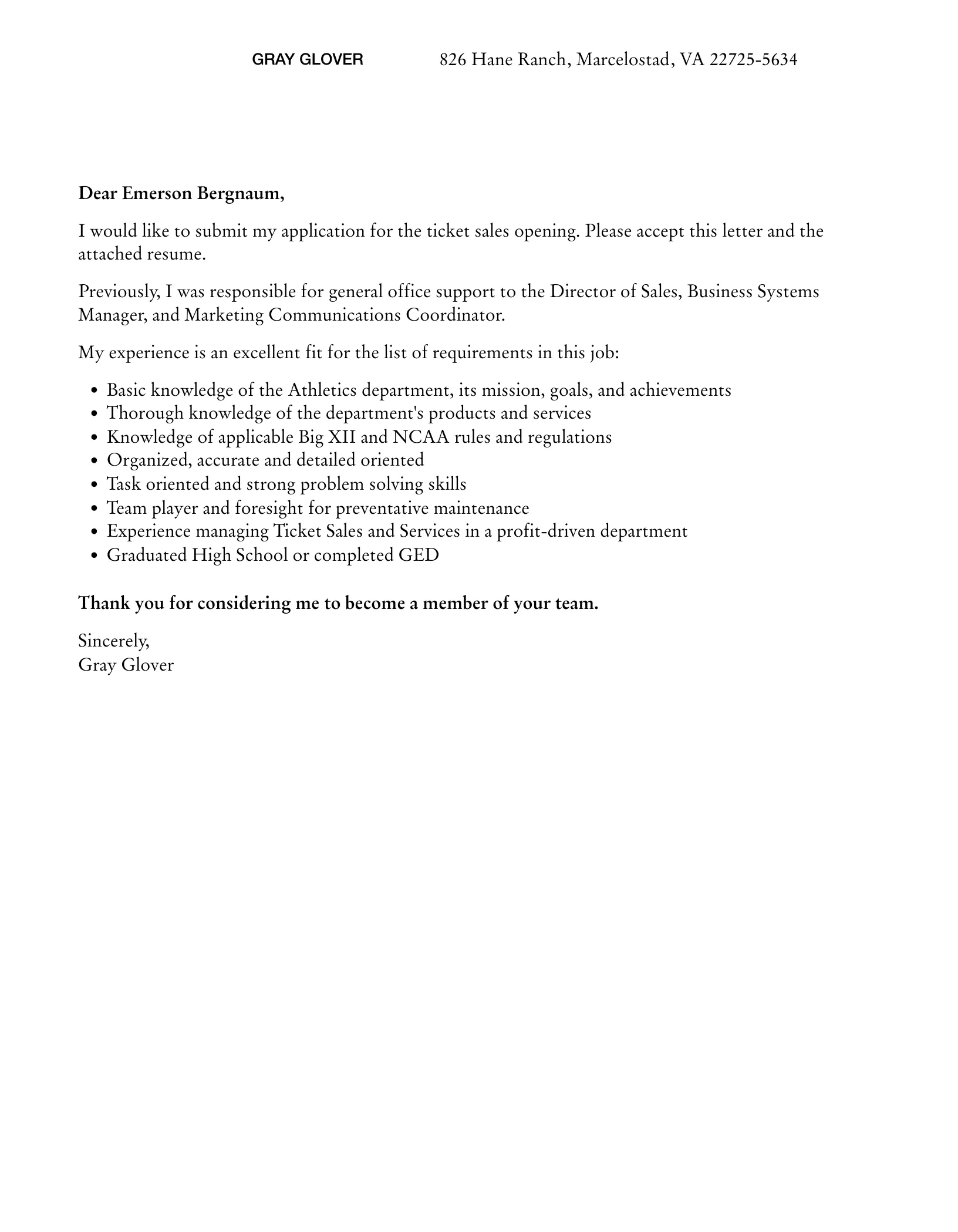
End your cover letter with a clear call to action. State your interest in an interview and thank the hiring manager for their time and consideration. Reiterate your contact information and express your availability for an interview. Make sure to tailor your call to action to the role itself. This way, the employer understands your interest in an interview.
Formatting and Proofreading
Your cover letter should be well-formatted and easy to read. Use a professional font, such as Arial or Times New Roman, and maintain consistent margins and spacing. Proofread your cover letter carefully for any typos, grammatical errors, or inconsistencies. A polished and error-free cover letter reflects your attention to detail and professionalism.
Customizing Your Cover Letter
Researching the Company
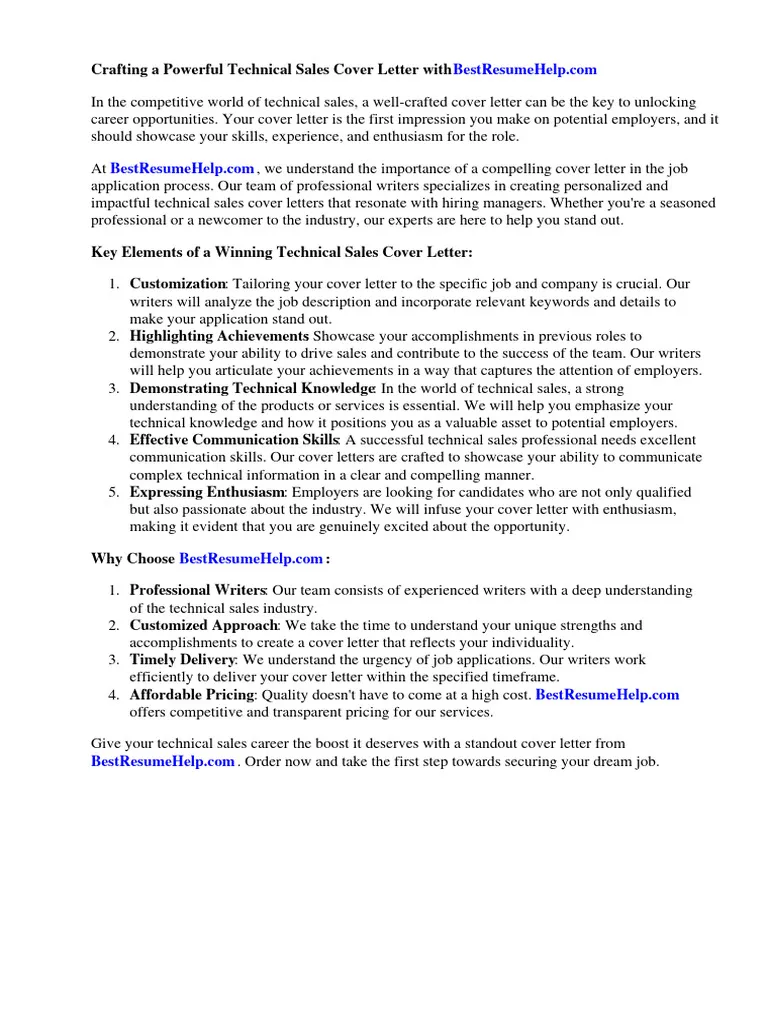
Before submitting your cover letter, thoroughly research the company. Understand their mission, values, and the events or venues they represent. This knowledge allows you to tailor your cover letter to the specific company and demonstrate your genuine interest. Visit their website, read industry news, and familiarize yourself with their brand. Make sure to customize the tone for each company you apply for. If the company has a more casual tone, consider adapting your cover letter to that setting.
Tailoring Your Letter to the Specific Role
Customize your cover letter to match the requirements of the specific role. Carefully review the job description and highlight the skills and experience that are most relevant. Use the keywords from the job description and make sure that your language and examples align with what the employer is seeking. Make each cover letter unique by showing the company that you care about this specific role.
Using Keywords from the Job Description
Incorporate keywords from the job description throughout your cover letter. This helps demonstrate that you have the required skills and experience and can also help your application pass through applicant tracking systems (ATS). Use keywords naturally within your sentences and ensure they accurately reflect your abilities. Make sure that each keyword fits organically in the text.
Following Up After Submission
Thank You Note for Following Up
If you haven’t heard back within a reasonable timeframe, send a thank you note. Briefly reiterate your interest in the role and thank the hiring manager for their time. This shows initiative and persistence.
Tips for Phone Interview
If you are called for a phone interview, make sure you prepare in advance. Research the company, review your cover letter and resume, and practice answering common interview questions. Have a pen and paper ready to take notes, and ensure you are in a quiet environment with a strong phone signal. Dress professionally, even for a phone interview, as it can influence your mindset. During the phone interview, be enthusiastic and show your knowledge. After the interview, send a thank you note.
Common Mistakes to Avoid
Generic Cover Letters
Avoid sending generic cover letters that are not tailored to the specific job or company. Hiring managers can easily spot generic letters, and they often end up in the rejection pile. Always personalize your cover letter to show that you have taken the time to learn about the role and the company. This includes matching your skills to what the job description requires. Using the STAR method and quantifiable results will make your cover letter more specific.
Typos and Grammatical Errors
Typos and grammatical errors can damage your credibility and professionalism. Proofread your cover letter carefully before submitting it. Use spell check and grammar check tools, but also read your letter aloud to catch any errors. Ask a friend or family member to review your letter for any mistakes that you may have missed. Make sure to double-check the hiring manager’s name and contact information. A cover letter riddled with errors is the fastest way to get your application rejected.
Lying or Exaggerating
Never lie or exaggerate your skills or experience in your cover letter. Employers can easily verify your claims during the interview process, and any dishonesty can result in your application being rejected. Be honest about your qualifications and focus on highlighting your strengths and achievements. Authenticity is valued and employers are able to recognize people who are genuine.
Overusing Jargon
Avoid using excessive industry jargon or technical terms that the hiring manager might not understand. Keep your language clear, concise, and easy to read. Use language that is appropriate for the industry. Ensure your cover letter is accessible and engaging. Avoid sounding overly technical and always maintain a professional tone.
